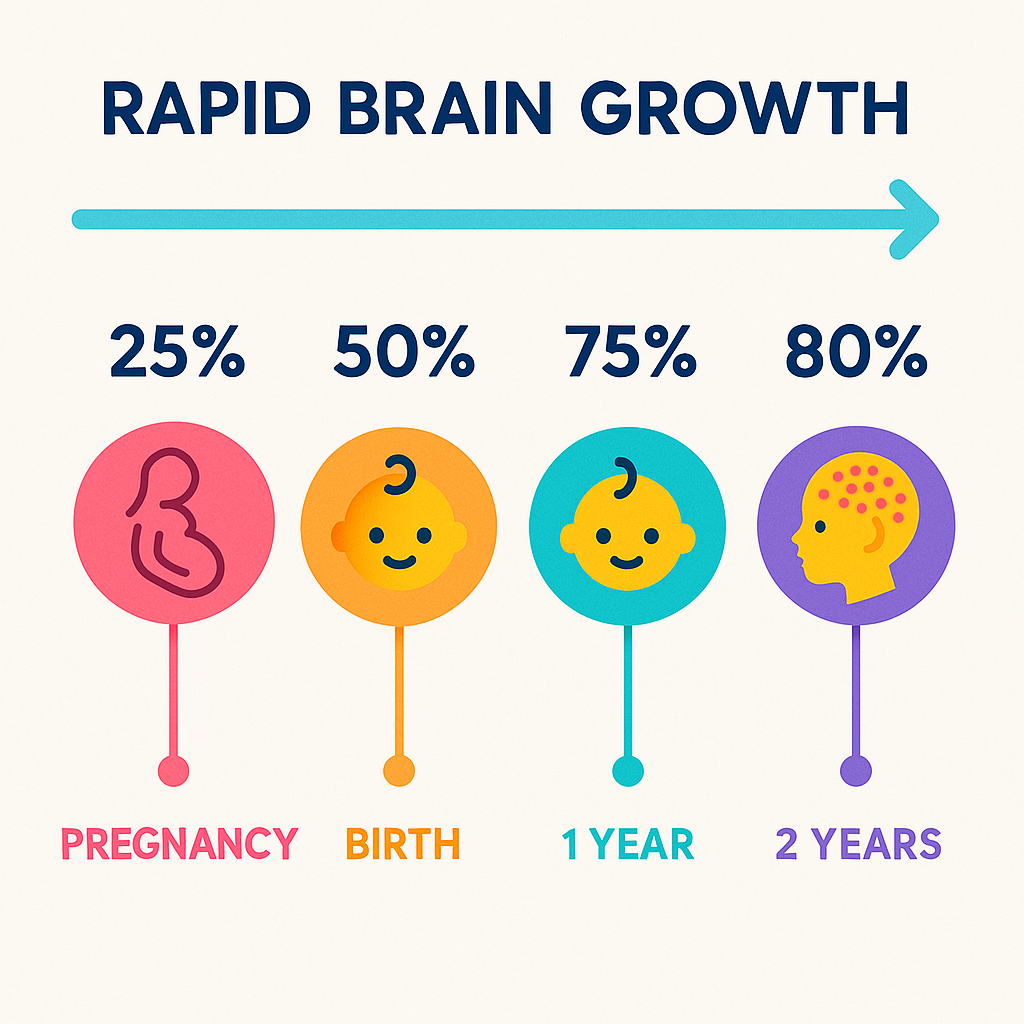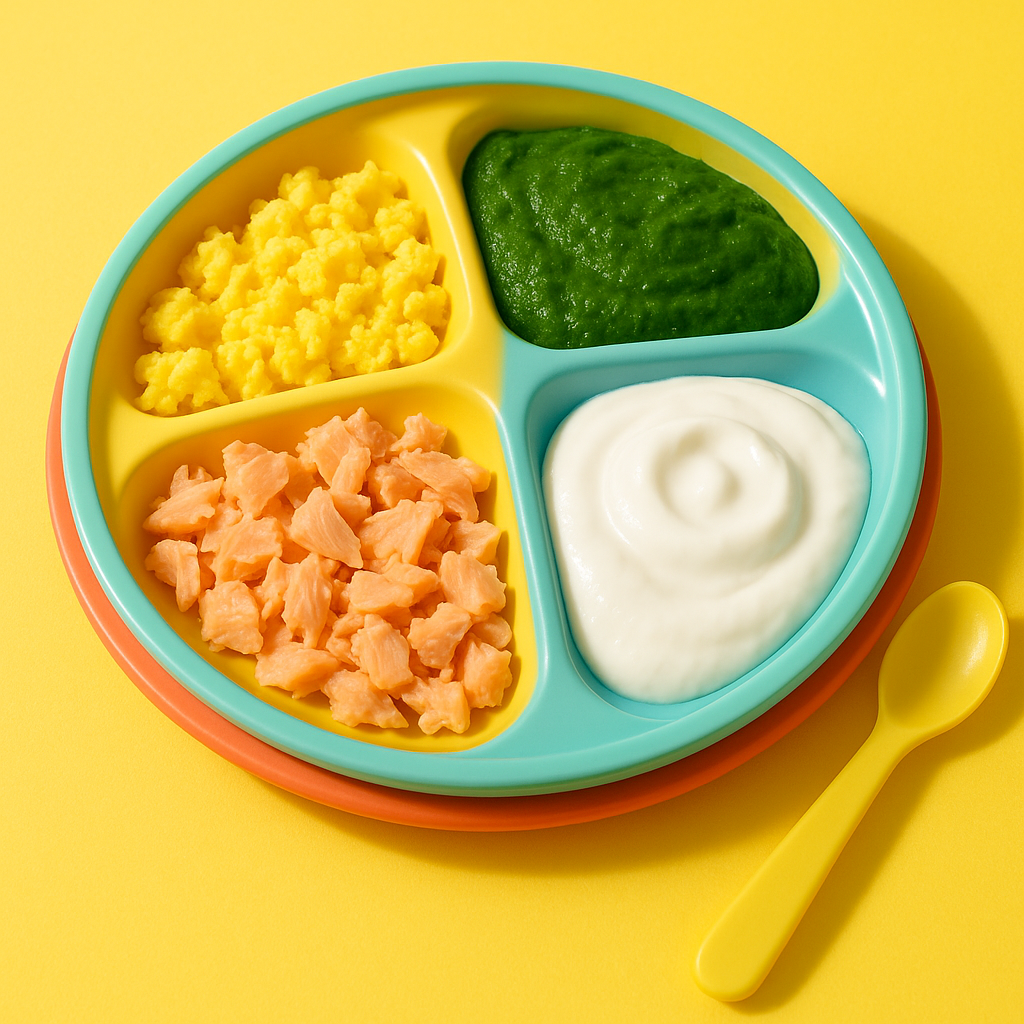Missing even one key nutrient in the first years of life can cost up to 10 IQ points. Your baby’s brain is building 250,000 new cells every minute, and food supplies the raw materials for every single one. The next few minutes will show you exactly which nutrients matter most—and the simplest ways to get them onto your baby’s spoon.
- Why is the first 1,000 days a “now-or-never” window for brain development?
- Which seven nutrients supercharge your baby’s brain—and what foods supply them?
- Choline: Essential for Memory and Neurotransmission
- DHA and EPA: Omega-3s for Neuron Flexibility and Vision
- Iron: Oxygen Carrier for Brain Function
- Iodine: Thyroid Support for Brain Growth
- Zinc: Neuronal Communication and Immunity
- Folate: DNA Synthesis and Neural Tube Formation
- Protein: Building Blocks for Cell Growth
- How can you close nutrient gaps when diets, budgets, or picky eating get in the way?
- Your Top Questions, Answered
- Final Thoughts
Why is the first 1,000 days a “now-or-never” window for brain development?
The short answer: Because 80 % of your child’s brain is built by age two, and the body can’t “redo” that job later.
During these 1,000 days—pregnancy through the second birthday—the brain demands about 60 % of total calories. Iron, zinc, iodine, and other micronutrients drive neurogenesis, myelination, and synaptic wiring at lightning speed. Studies show that correcting iron after age 2 rarely restores full attention span, while eliminating iron-zinc-iodine shortages could raise global IQ by a full 10 points.
Nutrients also work hand-in-hand with loving “serve-and-return” interactions and quality sleep. When you talk, cuddle, and read to your baby, you spark neural circuits; when you supply the right fuel, those circuits get strengthened instead of pruned away.

Which seven nutrients supercharge your baby’s brain—and what foods supply them?
The table below summarizes the nutrients, their recommended daily intakes for infants 7-12 months, and baby-sized food sources, with portions reflecting typical amounts for babies beginning solids around 6 months. These examples are not exhaustive but provide a starting point for meal planning.
| Nutrient | Recommended Daily Intake (7-12 months) | Baby-Sized Food Sources (examples) |
|---|---|---|
| Choline | 150 mg/day | One scrambled egg yolk, 2 tbsp mashed edamame |
| DHA & EPA | ~500 mg/day (total omega-3s) | 1 oz flaked salmon, 1 tsp canned sardine mash |
| Iron | 11 mg/day | 2 tbsp pureed beef, 3 tbsp lentil puree + strawberry |
| Iodine | 130 µg/day | ½ cup plain yogurt, small pinch (about 1/8 tsp) of iodized salt in puree |
| Zinc | 3 mg/day | 2 tbsp ground pumpkin seeds mixed into oatmeal, 2 tbsp beans |
| Folate | 80 µg/day | ¼ cup cooked kale puree, 2 tbsp black beans |
| Protein | 11 g/day | Breast milk/formula, 3 tbsp mashed navy beans |
The explanation below focuses on the scientific roles and additional context, avoiding repetition of the table’s content.
Choline: Essential for Memory and Neurotransmission
Choline is an essential nutrient that plays a key role in the formation of memory and cognitive functions. It is a precursor for the neurotransmitter acetylcholine, which is involved in memory and learning. Research has shown that adequate choline intake during pregnancy and infancy is associated with better cognitive performance later in life, as noted in Choline overview for health professionals. Since the body cannot produce enough choline on its own, it must be obtained through diet, and deficiencies can lead to impaired brain development, especially during rapid growth phases.
DHA and EPA: Omega-3s for Neuron Flexibility and Vision
DHA (docosahexaenoic acid) and EPA (eicosapentaenoic acid) are omega-3 fatty acids crucial for brain development, acting as major structural components of brain cell membranes. They promote flexibility and efficient communication between neurons, supporting synaptic pruning and neural connections. DHA is also vital for visual development, as the retina relies on it for optimal function. The evidence leans toward a total omega-3 intake of ~500 mg/day for infants, based on mean intake in healthy, breastfed infants, as seen in Omega 3 fatty acids overview. Since infants cannot synthesize these fatty acids efficiently, dietary sources are essential, and deficiencies can impact cognitive and visual outcomes.
Iron: Oxygen Carrier for Brain Function
Iron is critical for delivering oxygen to the brain via hemoglobin and supporting myelin production, which insulates nerve fibers and speeds up neural communication. Iron deficiency during infancy leads to long-term cognitive impairments. These include delays in motor skills, language development, and attention, as highlighted in Iron in foods health information. The brain’s high oxygen demand makes iron important. Its deficiencies are a common concern, especially in breastfed infants after six months when iron stores may deplete.
Iodine: Thyroid Support for Brain Growth
Iodine is necessary for the production of thyroid hormones, which regulate brain development and overall growth. Deficiency causes irreversible damage, including impaired hearing, language, and IQ, with research showing significant impacts in low-iodine regions, as noted in Iodine overview for health professionals. Adequate iodine is crucial during pregnancy and infancy, and deficiencies can lead to conditions like cretinism, emphasizing the need for consistent intake through diet or supplementation.
Zinc: Neuronal Communication and Immunity
Zinc is involved in numerous enzymatic reactions and is essential for the development and function of the nervous system. It plays a role in neurotransmission, supporting synaptic connections, and is vital for immune function, which indirectly supports brain health. Zinc deficiency leads to delayed cognitive development and growth impairments, with studies showing its importance in brain tissue integrity, as seen in Zinc overview. Ensuring adequate zinc is particularly important for infants transitioning to solids.
Folate: DNA Synthesis and Neural Tube Formation
Folate, also known as vitamin B9, is crucial for DNA synthesis and repair. It also aids in the formation of the neural tube during early pregnancy. It remains important for brain development in infancy, supporting the creation of new cells and ensuring proper brain function. Deficiencies, early in pregnancy, increase the risk of neural tube defects. On the other hand, continued adequacy supports cognitive development, as noted in Folate overview.
Protein: Building Blocks for Cell Growth
Protein provides the amino acids needed to build and repair brain cells, as well as neurotransmitters that regulate mood and cognition. It is essential for overall growth and development, with the brain requiring high protein turnover during rapid growth phases. Deficiencies lead to stunted growth and cognitive delays, and ensuring adequate protein intake is crucial, as infants transition to solid foods.
Practical Considerations: Introduce a variety of foods gradually, if your baby is 6 months or older, to meet these nutritional needs. Consult a pediatrician for tailored advice, especially for plant-based diets or allergies, to prevent deficiencies. This guidance addresses how to boost baby brain development and related concerns, like dietary restrictions.
Sneak a deeper dive into milk choices in Breast Milk vs. Formula: What’s Best for Baby’s Brain? and explore fatty-acid specifics in DHA and Omega-3: Why They’re Key for Your Baby’s Brain.

How can you close nutrient gaps when diets, budgets, or picky eating get in the way?
Start with food swaps, smart prep, and a dash of creativity.
- Vegetarian or vegan? Use algal-oil DHA, B12-fortified cereals, soy yogurt for choline, and double up on beans for iron.
- Tight grocery budget? Eggs cost about $0.25 each, canned salmon runs ~$3 a can, and frozen spinach delivers folate for pennies. WIC benefits cover all three.
- Boost absorption: serve bell-pepper strips with beans, soak or sprout lentils to raise zinc by 20 %.
- Safety first: choose low-mercury fish, avoid honey before age 1, and limit rice cereals due to potential arsenic content—see tips in Toxins in Baby Food.
- Tiny taste-testers: offer new foods up to 15 times before giving up. Combine foods with different textures and flavors. Babies often need repeats before accepting flavors.
Your Top Questions, Answered
-
When should I start iron-rich solids?
Around 6 months, once your baby shows readiness cues. Begin with iron-fortified oat cereal or pureed beef. -
Do breastfed babies need extra vitamins?
Yes, vitamin D supplements are recommended from birth, and iron supplements may be needed after 4-6 months if iron-rich solids are not introduced. Consult your pediatrician.* Learn more in How Breastfeeding Boosts Your Baby’s Cognitive Growth. -
How much fish is safe for my under-three toddler?
Offer 1 oz low-mercury fish two to three times weekly and skip high-mercury species like swordfish. -
Can I serve eggs daily?
Absolutely. Eggs are a great source of choline and other nutrients. Cook them until both white and yolk are firm to reduce the risk of foodborne illness. -
What are early signs of nutrient deficiency?
Signs can include pallor, irritability, slowed development (e.g., delayed babbling), poor growth, and frequent illnesses. If you notice any of these, consult your pediatrician.
Final Thoughts
Nourishing your baby with the right nutrients during the first 1,000 days sets the foundation for a lifetime of learning, focus, and resilience. Choline, DHA & EPA, iron, iodine, zinc, folate, and protein are the key players in this critical period. By incorporating these nutrients into your baby’s diet and providing loving interactions, you’re giving them the best possible start in life.
Lesser-Known Fact: Recent research highlights the role of gut microbiota in brain development. Breastfeeding promotes a healthy gut microbiota, which may enhance cognitive function through the gut-brain axis Early gut microbiome.
For more inspiration, download our printable cheat sheet and browse easy recipes in 10 Brain-Boosting Foods for Babies and Toddlers. Here’s to every spoonful lighting up new connections in your baby’s amazing mind.